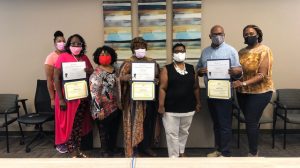
The Aaron E. Henry Community Health Services Center Inc., in conjunction with the UM Center for Population Studies and other New Pathways to Health and Opportunity initiative partners, conducted its annual training for community health workers in late July. Submitted photo
OXFORD, Miss. – Some two dozen Mississippi Delta residents and University of Mississippi students recently came together for training as community health workers.
The Aaron E. Henry Community Health Services Center Inc., in conjunction with the UM Center for Population Studies and other New Pathways to Health and Opportunity initiative partners, conducted its annual training for community health workers in late July.
As frontline public health workers who work to connect community members to health and social services, community health workers are more in demand than ever.
“Community health workers not only provide a service for their community members by acting as the bridge between the community and the local health care system, but a trained community health worker will have the ability to gain new skills and economic stability by increasing their possible job opportunities,” said Lynn Woo, interim director of the Center for Population Studies.
The center, which works to educate, conduct research and engage in public research surrounding population issues, has been collaborating with the Aaron E. Henry center as a partner in the New Pathways to Health and Opportunity initiative for many years. New Pathways programs offer health careers training and exposure to youth and adults in the Mississippi Delta, and helps connect participants’ experiences to employers and job opportunities.
Twenty-four participants met to learn about and discuss a variety of topics important to being a successful community health worker. Normally conducted in a Delta location, this summer’s training was adapted for Zoom because of the ongoing COVID-19 pandemic.
Because the training was offered virtually, participants from the broader region could participate. More than half were from the Delta, but trainees also logged in from the Mississippi Gulf Coast and Oxford.
For the first time this year, Ole Miss students pursuing the minor in society and health housed in the Center for Population Studies and the College of Liberal Arts took part in the training. Also, five participants were from Tri-County Workforce Alliance, another New Pathways partner organization that operates in Bolivar, Coahoma, Quitman, Sunflower and Tallahatchie counties.
“The annual certification training is essential to the core skills-building requirements for community health workers employed by Aaron E. Henry,” said Aurelia Jones-Taylor, Aaron E. Henry’s CEO. “Community health workers are part of the health care team that works closely with other health care professionals in a patient center medical home.”
Daily workshops helped trainees learn skills essential for effective community health workers, ranging from communication and advocacy to health literacy and medical terminology. Presenters included faculty and staff from Aaron E. Henry and the Center for Population Studies, along with partners from Right! From the Start, Harvard School of Public Health, the Community Health Center Association of Mississippi and the Mississippi State Department of Health.
John Green, senior research associate at the Center for Population Studies and co-director of the society and health minor program, led sessions on data collection and community assessment that featured Problem Solving for Better Health methodology.
“Being able to conduct and use research to inform health programming is an essential skill for community health workers,” Green said. “Incorporating research and strategic planning into the curriculum demonstrates that (Aaron E. Henry) is innovative in its approach.”
Recent UM alumna Megan Swartzfager, who graduated with a minor in society and health, participated in the training and felt that the diversity of participants was beneficial.
“Training with people from so many different backgrounds was eye-opening for me,” Swartzfager said. “As a student studying data, I appreciated that the professional community health workers and others in the training reminded me of the importance of empathy and listening.
“This went both ways, and people in the training with different backgrounds were convinced of the importance of data-driven community health work.”
Yolanda Sonley, a PrEP navigator at Aaron E. Henry, helps clients at risk of HIV infection to access health services and support. She found the training to be timely in addressing the current health care environment.
“It was an informative training that gave me pointers on how to enhance others’ knowledge on the importance of staying healthy and strong mentally, as well as physically, during this pandemic,” she said.
The New Pathways to Health and Opportunity initiative works to develop the health workforce in the Mississippi Delta. Besides Aaron E. Henry, Center for Population Studies and Tri-County Workforce Alliance, other partners include the Mississippi Hospital Association Health Research and Educational Foundation Inc.; the Rogosin Institute, with funding from the W.K. Kellogg Foundation; the Dreyfus Health Policy and Research Center; and Dialysis Clinic Inc.
For more information about the Center for Population Studies, visit https://cps.olemiss.edu/.